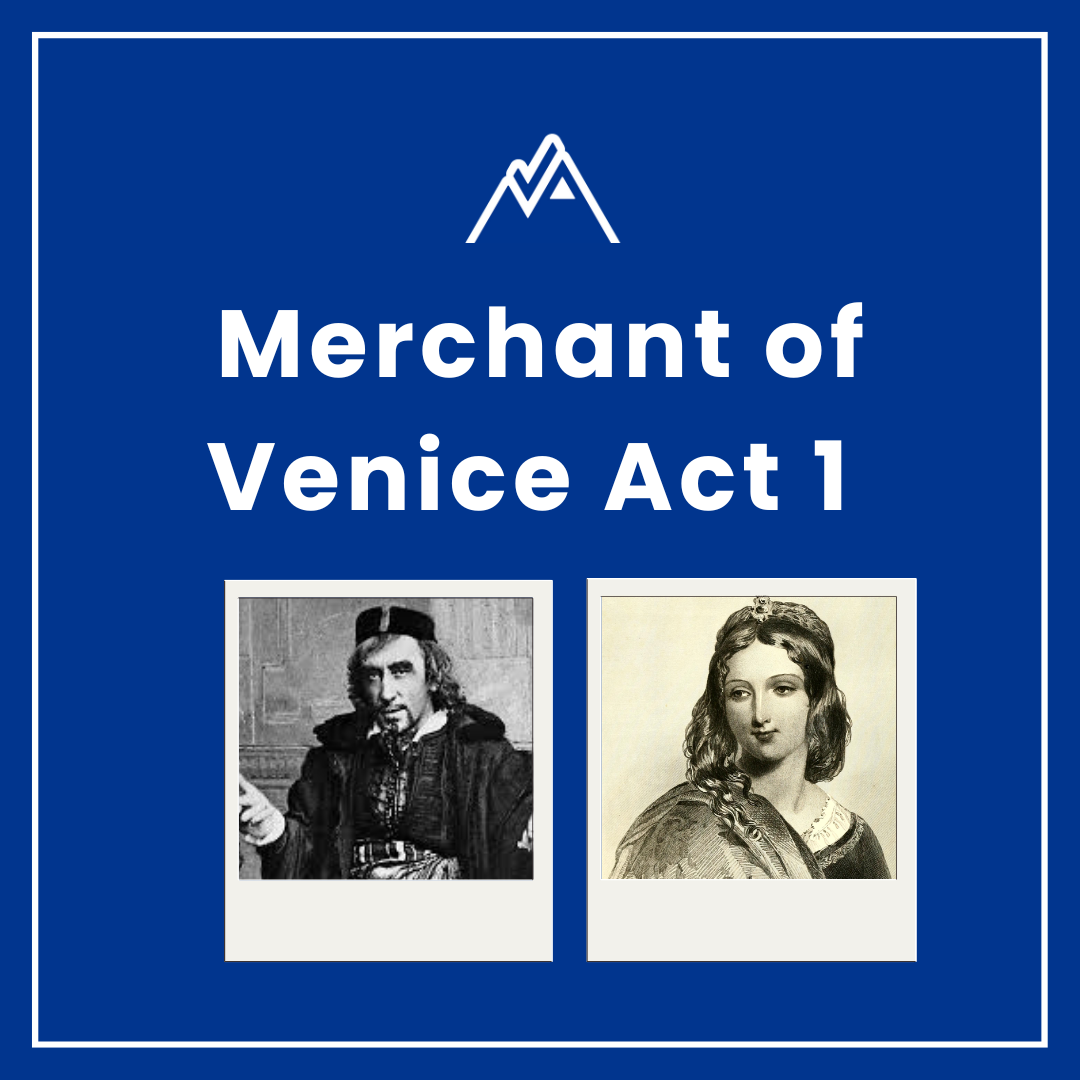The Merchant of Venice Act 1 Quotes
If you’re studying The Merchant of Venice for your Common Module, here are 13 key quotes from Act 1, complete with techniques and in-depth analysis.
Act 1 introduces the central motifs and themes of the play, exploring the dominance of wealth and commerce in Venetian society and exposing its deep class and religious divides, as well as setting up some of the major conflicts (Portia’s suitors, Shylock’s deal and Antonio’s wealth). These early moments not only introduce the play’s key conflicts but also reflect the broader moral and social divides that Shakespeare invites us to question.
Let’s dive in.
1. “Your mind is tossing on the ocean; There, where your argosies with portly sail (GRATIANO)
The metaphor ‘tossing on the ocean’ portrays Antonio’s mind as unstable and restless, likening his emotional state to the unpredictable sea, critiquing how material wealth has created of inner turmoil (as he is constantly worried about the state of his ventures).
The image of “argosies with portly sail’ evokes grandeur and prosperity, symbolizing Antonio’s wealth and commercial ventures to establish him as a man of great fiscal strength (after all, he is ‘The Merchant of Venice’). It further foreshadows the volatility of Antonio’s fortunes as they are lost to sea later in the play, creating the main complication as he forfeits the bond and is asked by Shylock for his ‘pound of flesh’
2. “I hold the world but as the world, Gratiano; A stage where every man must play a part, And mine a sad one.” (ANTONIO)
Antonio’s metaphor ‘A stage where every man must play a part’ reflects the performative nature of life, aligning with Elizabethan conceptions of predeterminism and providentialism, where fate and destiny is controlled and defined by God.
His self-assigned role as ‘a sad one’ reveals his sense of melancholy and foreshadows the significant sacrifices he will make for Bassanio. The phrase ‘must play’ emphasizes a lack of choice, reinforcing themes of inevitability and duty, as he feels he must help Bassanio as his trusted friend.
3. “In Belmont is a lady richly left, And she is fair, and fairer than the word, Of wonderous virtues.” (BASSANIO)
Bassanio describes Portia as “richly left,” immediately prioritising her wealth as he adds that “she is fair, and fairer than that word.”
The juxtaposition between her material fortune and physical beauty reveals his mixed motives of love and financial gain, suggesting that his pursuit of Portia is driven as much by his dire economic need as by his affection for her, complicating his heroic quest to woo her.
The hyperbole “fairer than that word” elevates Portia to an idealised status, while his reference to her “wondrous virtues” gestures to her inner qualities, though these appear secondary to her beauty (and her significant inheritance) in Bassanio’s view.
4. “O, me, the word “choose”! I may neither choose who I would nor refuse who I dislike.” (PORTIA)
The repetition of “choose” in “ The word choose. I may neither choose who I would nor refuse who I dislike’ highlights Portia’s frustration with her lack of agency despite her clear intelligence and wit.
The paradox between “choose” and “refuse” highlights the irony of Portia’s situation - although she appears to have the freedom to choose her husband, this choice is an illusion. Her father’s will removes her agency, as the outcome is predetermined by the casket test, leaving her future entirely dictated by patriarchal authority.
The exclamation ‘O, me’ conveys her emotional turmoil and heightened frustration at her patriarchal subservience, reinforcing the tension between her defined wit and intelligence, and the social structures that confine and demean her, emphasizing the theme of constrained freedom within the play.
5.“So is the will of a living daughter curbed by the will of a dead father” (PORTIA)
The juxtaposition of “living daughter” and “dead father” underscores the enduring control of patriarchal authority even beyond death that afflicts even the subversive island of Belmont (which is more matriarchal than traditionalistic Venice).
The metaphor “curbed” suggests restriction and suppression, illustrating the tension between Portia’s autonomy and her duty to her father’s wishes.
6. “If I live to be as old as Sibylla, I will die as chaste as Diana, unless I be obtained by the manner of my father’s will” (PORTIA)
The classical allusions to Sibylla, a prophetess of ancient times famous for her extreme age, and Diana, the Roman goddess of feminine virtue and purity, connects Portia’s predicament to themes of prophecy and chastity, elevating her plight to a mythical level.
The hyperbolic ‘I will die as chaste as Diana’ emphasises her (forced) commitment to obeying her father’s will, even at the cost of personal happiness. The hyperbole intensifies the stakes of her situation, portraying her as virtuous (like Diana) yet trapped by tradition as despite her intelligence and ‘godly’ virtue, she is restricted by Elizabethan Patriarchal norms.
7.“If I should marry him, I should marry twenty husbands! If he would despise me, I would forgive him, for if he love me to madness, I shall never requite him” (PORTIA)
The hyperbolic phrase “marry twenty husbands” humorously exaggerates Portia’s disdain for one of her suitors, revealing her sharp wit and unwillingness to conform to societal expectations of passive femininity.
Her remark, “if he love me to madness, I shall never requite him,” highlights her intelligence and self-awareness, as she recognises the futility of love without genuine reciprocity. The irony in her mockery not only exposes the absurdity of arranged or obligatory marriage but also asserts her agency within the patriarchal structures that attempt to control her choices.
8. “How like a fawning publican he looks! I hate him for he is a Christian” (SHYLOCK about ANTONIO)
Shylock’s aside reveals his disdain for Antonio, describing him as a ‘fawning publican’, a derogatory comparison to a servile tax collector, who were hated during the Elizabethan era (and possibly still today)
The phrase ‘I hate him for he is a Christian’ introduces the pervasive religious tension, framing Shylock’s animosity as rooted in both personal grievance (ie his personal distain for Antonio) and long standing cultural conflict. This sets the tone for Shylock’s later actions (i.e. the pound of flesh) and highlights the deep societal divisions in the play.
9. “I will feed fat the ancient grudge I bear him” (SHYLOCK)
The metaphor “feed fat the ancient grudge” encapsulates Shylock’s deep and deliberate desire for revenge, likening his hatred of Antonio to something that can be nourished and strengthened over time.
The adjective “ancient” reinforces the enduring nature of this hostility, rooted in centuries of religious and cultural tension between Jews and Christians as well as Antonio’s personal mistreatment of him.
Through the aside, Shakespeare allows the audience intimate access to Shylock’s internal thoughts, revealing a man whose vengeance is shaped as much by historical oppression as by individual resentment, positioning him as a complex and morally ambiguous antagonist.
10. “The devil can cite Scripture for his purpose! An evil soul producing holy witness Is like a villain with a smiling cheek, A goodly apple rotten at the heart” (ANTONIO)
Antonio’s exclamation, ‘The devil can cite Scripture for his purpose’ uses a Biblical allusion to accuse Shylock of manipulating sacred texts for malicious intent by loaning money with interest (usury), framing him as deceitful and corrupt.
The simile ‘evil soul producing holy witness’ highlights the hypocrisy of appearing righteous while harboring immoral motives. Similarly, ‘a villain with a smiling cheek'; and ‘a goodly apple rotten at the heart’ emphasise the contrast between outward appearances and inner corruption, portraying Shylock as charming yet fundamentally malicious.
11. “You call me misbeliever, cutthroat dog, And spet upon my Jewish gaberdine, And all for use of that which is mine own” (SHYLOCK)
The listing of insults “misbeliever” and “cut-throat dog” exposes the relentless verbal abuse Shylock endures from Antonio.
The vivid image of Antonio who “spet upon my Jewish gaberdine” captures the physical humiliation and public degradation he suffers, revealing the depth of prejudice embedded within predominately Christian Venetian society. The repetition of “mine own” intensifies Shylock’s indignation as he asserts his right to dignity and property in the face of discrimination, illustrating the entrenched moral and cultural divide between Christian hypocrisy and Jewish marginalisation.
12. “An equal pound Of your fair flesh, to be cut off and taken In what part of your body pleaseth me” (SHYLOCK)
The demand for ‘an equal pound of your fair flesh’ is both a literal contract term and a metaphor for Shylock’s desire for revenge. The grotesque image of human flesh as collateral transforms a business contract into an instrument of vengeance, exposing the merging of commerce and cruelty in money driven Venetian society.
The adjective “fair” carries irony, as it traditionally connotes beauty and virtue but here describes pale flesh marked for mutilation. The precision of “a pound” evokes the cold, transactional logic of trade, while the phrase “what part of your body pleaseth me” reveals Shylock’s assertion of power and his desire to invert the hierarchy that has long oppressed him.
13.“The Hebrew will turn Christian; he grows kind” (ANTONIO)
Antonio’s comment ‘The Hebrew will turn Christian; he grows kind’ uses irony to imply that kindness is inherently Christian, perpetuating a stereotype of Jewish greed. This line reflects Antonio’s deep- seated prejudice, framing his worldview in terms of religious superiority. It also foreshadows the forced conversion of Shylock later in the play, reinforcing the oppressive dynamics between Christians and Jews
Looking for some extra help with your Merchant of Venice Essay?
We’ve got an incredible team of English tutors at Pinnacle!
If you’re studying Merchant of Venice for your Common Module, we’ll help you strengthen your essay writing and build the confidence to ace your next assessment.
Our one-on-one lessons are available online or in person at our office in Rozelle, giving students across Sydney’s Inner West (Balmain, Leichhardt and beyond) the support they need to excel.
Over the years, our students have boosted their results by 20% or more through expert guidance, proven strategies, and mentoring that goes beyond the textbook.


